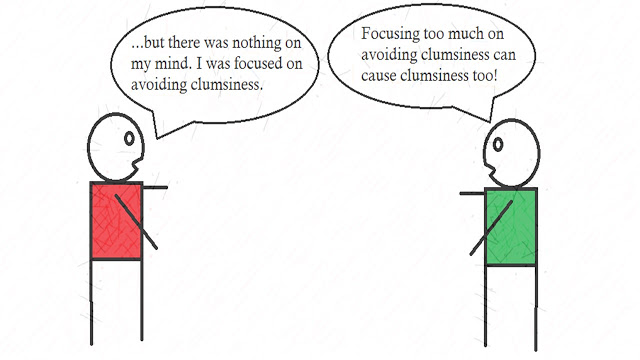笨拙背后的心理学

Table of contents
本文将探讨 "笨拙 "背后的心理学,以及人们为什么会因为笨拙而跌倒或掉东西。 当然,一个人跌倒或掉东西的背后可能有纯粹的生理原因。
在本文中,我将重点讨论这种行为背后纯粹的心理原因。
当他手捧一束玫瑰花走到她面前,心里想象着自己把花束送给她的情景时,不小心踩到了香蕉皮,"砰 "的一声摔倒在地。
他可能摔断了一两根肋骨,不得不立即住院治疗。 然而,尴尬带来的精神伤害远远大于身体伤害。
See_also: 儿童情感忽视测试(18 个项目)你在电影、电视或现实生活中看到过多少次这样的场景?
是什么导致了笨手笨脚的人笨手笨脚和容易出事故?
注意力不集中,笨手笨脚
我们的意识在同一时间只能关注有限的几件事情。 注意力和意识是一种宝贵的精神资源,我们只能将其分配给少数几件事情。 通常,这些都是在特定时刻对我们最重要的事情。
See_also: 肢体语言中的斜视注意广度有限意味着,当你把注意力集中在环境中的某件事情上时,你同时也把注意力从其他所有事情上转移开了。
如果你走在街上,看到街对面有一个迷人的人,你的注意力就会集中在那个人身上,而不是你要去的地方。 因此,你很可能会撞上灯柱或其他东西。
现在,争夺我们注意力的干扰不仅存在于外部世界,也存在于我们的内心世界。 当我们把注意力从外部世界转移到内心世界的思维过程时,笨拙就很可能随之而来。
事实上,大多数时候,造成笨拙的是内心的杂念,而不是外在的杂念。
假设你的注意力有 100 个单位,当你完全没有任何杂念,对周围环境了如指掌时,你就不太可能做出笨拙的举动。
现在,假设你在工作中遇到了一个问题,你很担心。 比如说,这占用了你 25 个单位的注意力。 现在,你还有 75 个单位的注意力可以分配给周围的环境或你正在做的事情。
由于你现在不太注意周围的环境,所以很可能会笨手笨脚。
现在,如果你今天早上和你的伴侣吵了一架,并且也在为这件事耿耿于怀呢? 假设这件事又占用了你 25 个单位的注意力。 现在只有 50 个单位可以分配给周围的环境,因此你比上一种情况更容易变得笨手笨脚。
明白我的意思了吗?
当人们的认知注意力带宽已满,即他们只剩下 0 个单位可以分配给周围的环境时,他们就会 "无法忍受 "或 "需要一些独处的时间 "或 "需要休息 "或 "想要远离噪音"。 这让他们能够解决内心的问题,从而释放他们的注意力带宽。
如果对周围环境的注意力不足或根本没有注意力,就可能导致严重事故,不仅会造成尴尬,还有可能致命。
因此,无论是电影还是现实生活中,大多数致命事故都发生在一个人内心动荡的时候。

焦虑是导致笨拙的主要原因之一
......但并不是唯一的原因。 除了担心或焦虑,还有很多事情会占用你的注意力带宽。 任何将注意力集中在内心世界的事情都会自动将注意力从外部世界转移开,从而有可能导致笨拙。
心不在焉顾名思义就是你的心思(注意力)在别的地方。 因此,任何形式的心不在焉都会导致一个人笨手笨脚。 焦虑只是心不在焉的一种表现形式。
假设你在看一部电影时非常开心,但又无法停止思考。 这部电影占据了你大部分的注意力。 因此,尽管你一点也不焦虑,但还是可能会摔东西、绊倒或撞到东西。
结论
你越专注于内心世界--你的思维过程世界,你就越不专注于外部世界。 不专注于周围环境会导致你在与周围环境互动时犯下 "错误"。 这就是笨拙。
由于人类的注意力有限,笨拙是我们认知构成的必然结果。 虽然无法完全消除笨拙,但通过解决情绪问题和提高情景意识,可以大大减少笨拙的频率。

